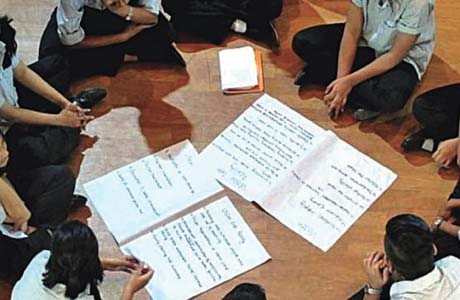A Levels: Multidimentional Education

Jessica Rai: A Levels is an offering to Secondary Education Examinations (SEE) graduates in lieu of Plus-two. ‘A Levels' refers to ‘Advanced Level' General Certificate of Education (GCE). This qualification in Nepal has been designed by Cambridge International Examinations (CIE) - a part of Cambridge Assessment that is a department of the University of Cambridge. With high quality curriculum, the internationally recognised qualification "prepares school students for life, helping them develop an informed curiosity and a lasting passion for learning".
It is equivalent to National Examinations Board (former Higher Secondary Education Board), but the approach of A Levels differs. Mabindra Regmi, A Level Coordinator, GEMS Institute of Higher Education explains, "Plus-two is the high school programme of Nepal, and A Levels is its equivalent, offered in the UK. The content is similar, but the approach to how we understand the content and apply, is quite different. This is apparent through the evaluation system and the question pattern. Students are taught to be more analytical and persuasive in A Levels. More engagement with the content is expected leading to thorough understanding and its subsequent application in different/real life situations."
"The teaching and learning process is very good. They take the best out of the students, emphasising on understanding and knowledge and developing skills rather than rote learning - it is not just about passing different levels," Executive Director of Xavier International, Gopal Bhandari expresses, which is why he believes "it is the best education system because of its curriculum and assessment and reliability."
As per Suman Nagarkoti, Principal of Saipal Academy, A Levels involves four-dimension of teaching-learning technique - knowledge and understanding, application, analysis, and evaluation.
"These dimensions make this programme enriching, strong and practical," he adds.Those who have passed SEE or other degrees equivalent to SEE can opt for this course. But since it is affiliated to the University of Cambridge, Bhandari feels, a student should have a good command over English language. In addition, he says, "It is not for everyone. It is for students who are innovative and creative and can think critically."A Levels is a two-year course that is divided into two parts - Advance Subsidiary (AS) and Advanced (A or A-2) Level.
As per CIE's website, A Levels offers "a choice of 55 subjects and schools can offer them in almost any combination. This flexibility means schools can build an individualised curriculum, and learners can choose to specialise in a particular subject area or study a range of subjects".So students can "explore subjects" - Physics, Chemistry, Biology, Mathematics, Art and Design, Economics and Sociology to name a few - from the streams of Science, Management and Humanities and Social Sciences."You can take crossover subjects in A Levels - so you are allowed to choose subjects like Physics, Mathematics and Economics," Sushant Tripathi, Programme Coordinator of Malpi Institute says illustrating one of the advantages of opting for A Levels. As such students have "bigger advantage" to choose the best of subject combinations as per their interest and career.
When it comes to assessment, CIE holds Cambridge International AS and A Level examination series twice a year, in June and November. It is student-friendly as a student can take AS Level exams in one series and complete the final Cambridge International A Level exams at a subsequent series, or take all papers of A Level course (of both AS Level and A Level) in the same examination session, usually at the end of the course.
Each subject that a learner takes receives a separate grade - A* (highest: 90 to 100) to E (minimum required performance: 40 to 49). There is no A* grade for AS Level which runs from grade A to E. A Levels is completed in Nepali context when a student receives minimum 3.5 credit, which means three ‘A' level grades, and one ‘AS' level grade (A refers to a full two-year course that carries 1.0 credit, and AS refers to one-year course, which carries 0.5 credit).
"One needs 3.5 credit in order to apply for universities abroad. Some universities also accept 2.5 credit," Regmi cites.
"A Level qualification has recognition in 160 countries," informs Tripathi adding, "Universities easily accept students with A Levels. Students with good grades along with extracurricular activities are receiving good scholarship; they are also getting placements in the best universities."
source: Jessica Rai (2017),"Multidimentional Education", The himalayant times, 24 april 2017
Photos: Courtesy Xavier International / GEMS / Malpi Institute / Saipal Academy
Posted on: 2017-04-24






























